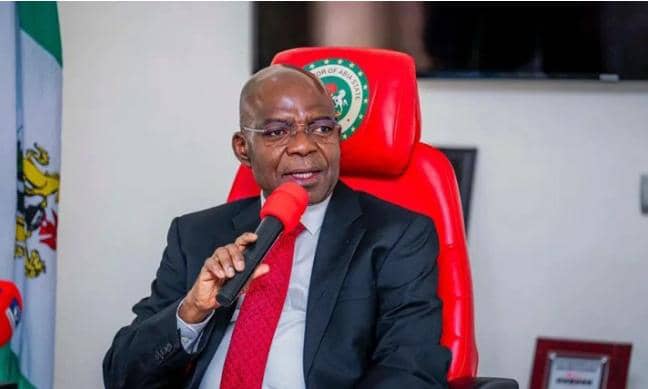Foreign doctors, nurses rush Abia’s 771 jobs as Otti vows meritocracy

(DDM) – Abia State Governor, Dr. Alex Otti, has announced that medical professionals from Zambia, South Africa, and several Nigerian states have applied for the state’s ongoing recruitment exercise aimed at filling 771 healthcare positions.
Diaspora Digital Media (DDM) gathered that the large-scale recruitment seeks to strengthen Abia’s healthcare system by absorbing doctors, nurses, and allied professionals into both urban hospitals and rural primary healthcare centres.
Governor Otti disclosed this development during his monthly media chat at Government House, Umuahia, on Thursday evening.
He described the applications from foreign professionals as a sign of growing trust in his government’s reform agenda.
“The fact that people from outside Abia, and even outside Nigeria, are applying shows the confidence that our policies are building,” Otti said.
He assured that the process would be based on merit, with written tests and screening exercises designed to ensure only qualified candidates are employed.
According to him, transparency and competence remain central to his administration’s vision for service delivery.
The governor explained that additional Primary Healthcare Centres (PHCs) had recently been made functional, a move intended to expand access to care in underserved areas.
He added that accommodations would be provided for healthcare personnel posted to rural PHCs to guarantee 24-hour service delivery and to encourage professionals to work outside major cities.
Observers note that this policy could be crucial in addressing the uneven distribution of medical staff across the state, where urban hospitals are often overcrowded while rural clinics remain under-staffed.
Governor Otti also highlighted progress in the agricultural sector, pointing out that his administration had adopted technology to identify and monitor genuine farmers.
He confirmed that 45,000 farmers had already been enumerated under a new system designed to curb fraud in subsidy allocation and ensure that support reaches only authentic beneficiaries.
According to Otti, farmers are being supported to shift from subsistence to commercial farming.
He stressed that this transition would boost food security, expand the state’s economy, and discourage rural-urban migration by providing sustainable livelihoods in villages.
Turning to education, Otti celebrated the re-accreditation of all 33 courses at Ogbonnaya Onu Polytechnic by the National Board for Technical Education (NBTE).
The re-accreditation, he said, restored academic credibility to the institution after years of neglect that had seen several courses withdrawn.
Analysts believe that Otti’s reforms in healthcare, agriculture, and education reflect a governance model rooted in human capital development and institutional strengthening.
They argue that the decision to employ hundreds of medical professionals could mark a turning point in Abia’s health sector at a time when Nigeria continues to lose doctors and nurses to migration abroad, popularly known as “japa.”
According to data from the Nigerian Medical Association (NMA), over 15,000 Nigerian doctors are currently practicing in the United Kingdom alone, with thousands more in the U.S., Canada, and Saudi Arabia.
This exodus has left many Nigerian hospitals understaffed, with patient-to-doctor ratios far below the World Health Organization’s (WHO) recommendations.
By contrast, Abia’s recruitment drive and the unexpected interest from foreign applicants may signal a rare reversal of that trend.
Experts caution, however, that sustaining this momentum will depend on the state government’s ability to provide competitive remuneration, functional infrastructure, and a safe working environment.
Civil society groups in Abia have welcomed the recruitment but stressed that healthcare workers must also be adequately motivated to remain in the system.
For residents, the hope is that the 771 new medical staff will not only improve access to care but also reduce the pressure on overstretched hospitals across the state.
As the recruitment process continues, Abia State is fast emerging as a case study for how sub-national governments in Nigeria can tackle brain drain and revive essential services through merit-driven reforms.
Post Views: 3





